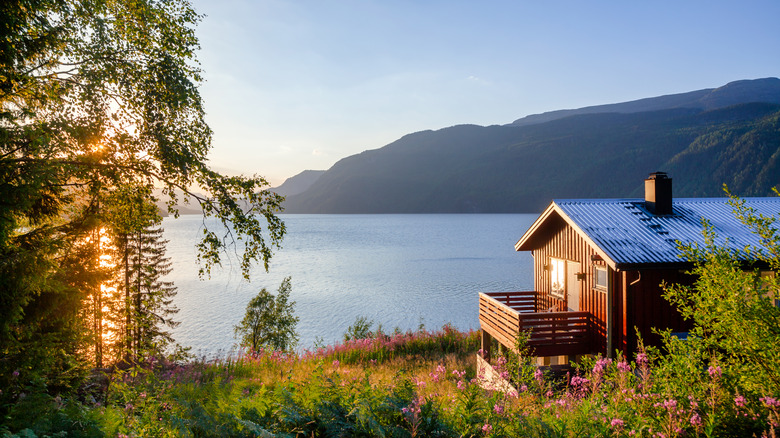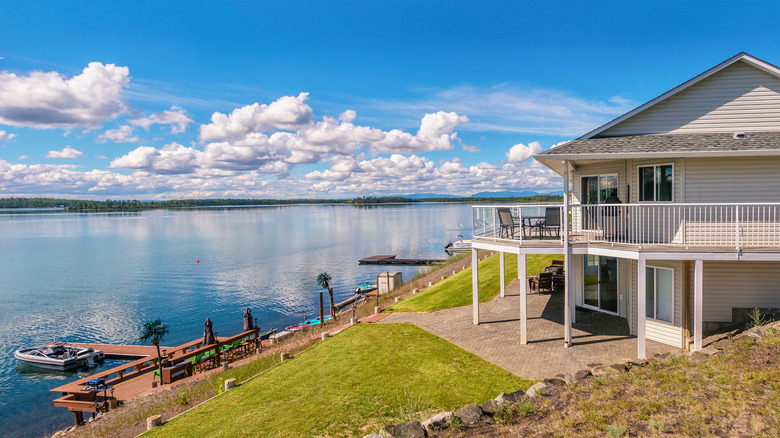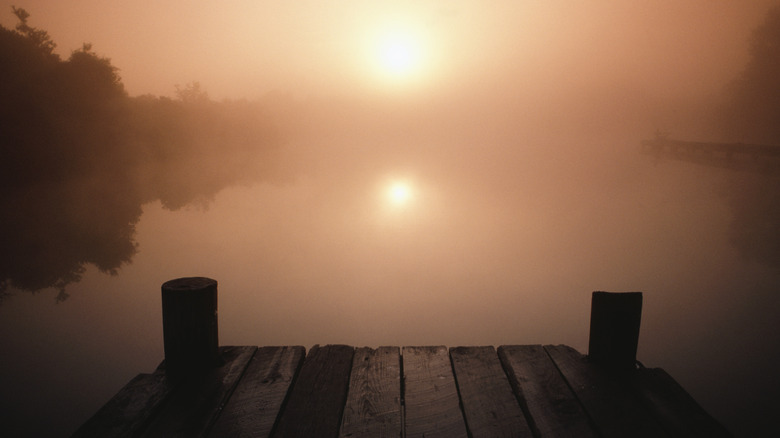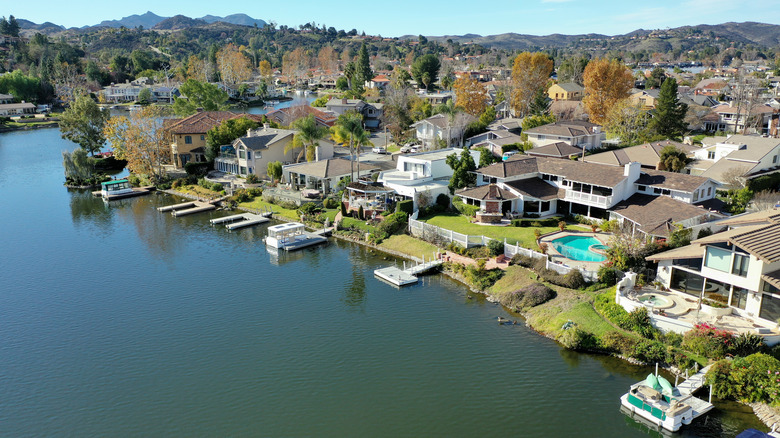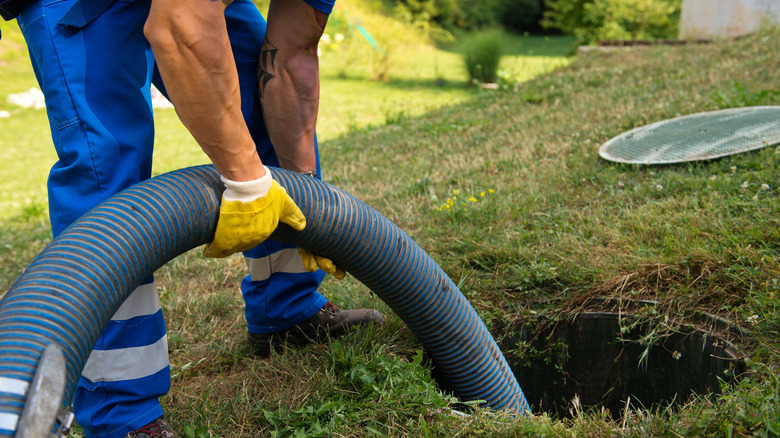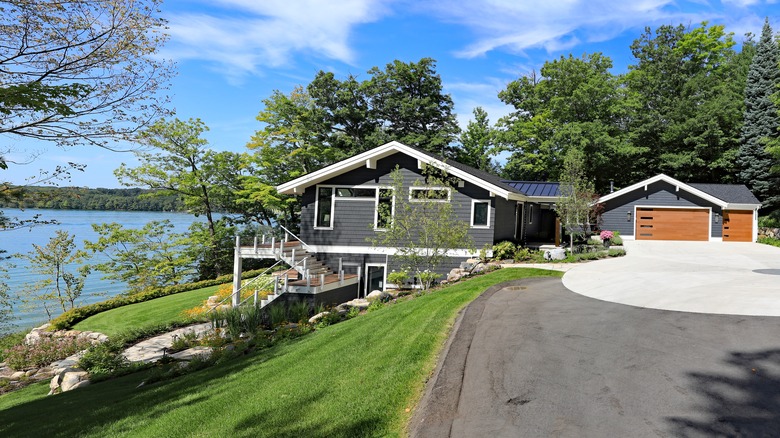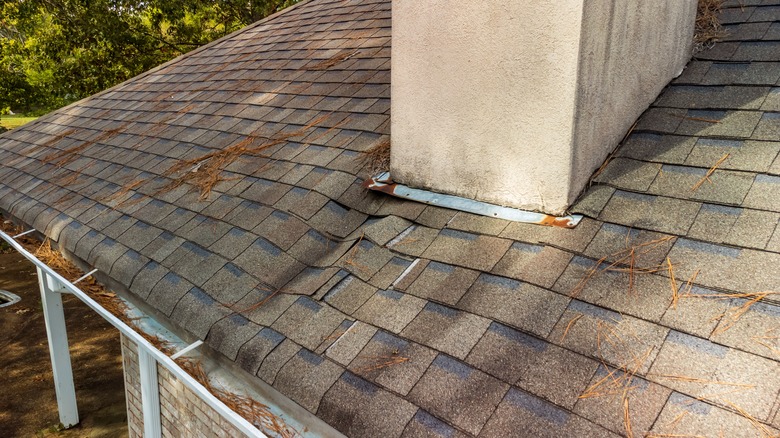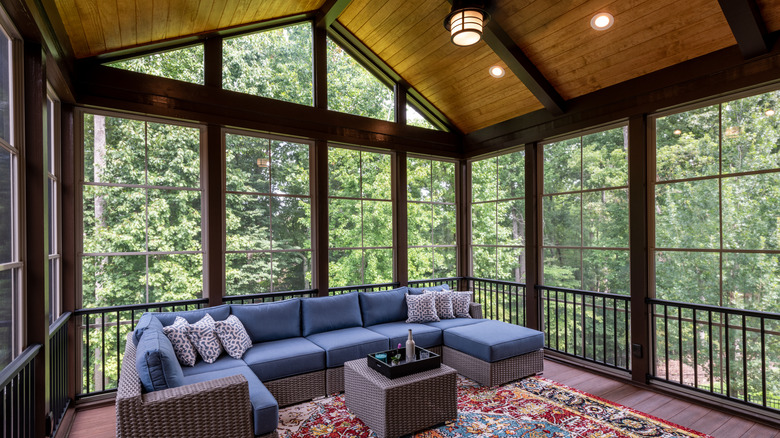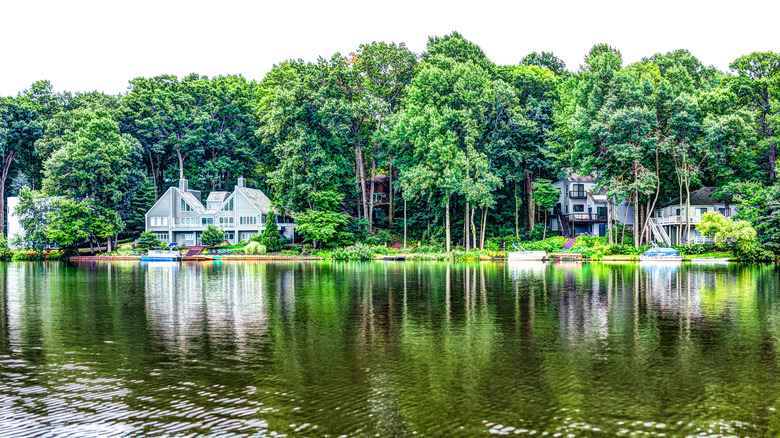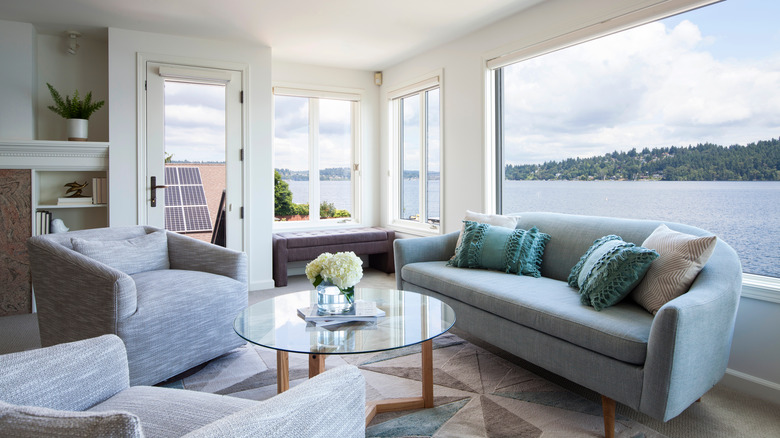Things To Consider Before Buying A House On A Lake
Do you dream of living near the water? Would you love to walk out your door and be just steps from jumping in your canoe, hopping on your jet ski, or taking a refreshing swim? If so, you may be thinking about buying a house on a lake. Overlook shares several other benefits of having a lake house, beyond the obvious appeal of being close to the water. By spending more time outdoors enjoying all this lifestyle has to offer, you'll likely increase your physical activity. Owning a waterside property can also potentially cut down on your yearly vacation costs. You'll have a built-in vacation destination, ready whenever you are, and may not feel the need to have a travel budget dedicated to hotels, airfare, and dining out.
Before you jump in the deep end —- pun intended — and rush to buy a lake house, there are a few important things that you'll want to consider. Taking some time to really think about certain factors can help you decide if it's the right purchase for you. And, if it is, these factors can help you choose the best property for your needs.
What type of insurance do you need?
As with any house, you'll need to purchase insurance for a lake house. However, there are a few additional considerations to keep in mind. According to Edina Realty, many waterfront properties have additional structures or buildings, beyond the primary residence. These may include docks, storage sheds, outhouses, or bunkhouses. If this is the case with the property you plan to purchase, you'll want to get coverage for these structures as well, as they may not be included within a standard policy.
If you plan to purchase any boats, jet skis, golf carts, or watercraft, don't forget that these are also unlikely to be covered by a standard policy. Talk with your agent about separate insurance policies to protect yourself, others, and your property when these vehicles are used. It could also be a good idea to take out an umbrella liability policy. This can provide you with more coverage for any accidents that happen on your property for which you could be held liable.
Bankrate explains that separate flood insurance may also be needed for many lakeside properties, particularly if they are in a flood zone. A homeowner's insurance policy likely won't cover damage caused by flooding water, so you could be left facing serious bills if your property floods during a storm. Having flood insurance can help reduce the stress and worry about what you'd have to do if something catastrophic happened.
Which direction is the house facing?
The direction a lake house is facing may not seem like that big of a deal. However, it really can make a big difference. As Jack Chivers Realty explains, the direction a lake house (and therefore each interior room) faces will impact the sunlight that enters the home. Whichever side of the home is facing the south will receive the most sunlight, which will mean that these rooms will also be warmer during the colder winter months. If you're looking for a lake house in an area with cold winters, this could significantly impact your comfort in the home and the utility costs.
The Wisconsin Department of Natural Resources shares how the direction the house is facing and its location on the lake will also impact your views. Many people love watching either the sun rise or set over a lake. If you choose a lake house on the east side of a lake, you'll be in an optimal location for viewing the sunset. Conversely, with a house on the west side of the lake, you may be able to watch gorgeous sunrises from your home. If one of these sounds more appealing to you, then keep that in mind as you search for a lake house.
In addition to considering which side of the lake the house is on, you should also think about which way the house is oriented in relation to the lake. Russell Lands explains why 'pier appeal' is more important than traditional curb appeal when it comes to lakes. Rather than opting for the front of the house to face the street, the most attractive view of the home should be facing the water. After all, when you're at your lake house, you're likely going to be spending more time entering the house from the lakeside, rather than the street.
Is there a homeowner's association?
Like any other property, a lake house may or may not be part of a homeowner's association. Lake Homes Realty shares that you should have a conversation with the homeowner's association (if there is one) before finalizing a decision to purchase the home. One thing that you'll want to find out is what the association's rules are, and if these rules are going to restrict you from using the property as you wish. If you're planning to build a patio or deck, you'll want to confirm that there aren't any special considerations that you'll need to take into account. Some HOAs may restrict stain and paint colors, the landscaping allowed on a property, the height of fences, whether you'll be allowed to set up a satellite dish, and more.
It is also important to find out information about how expensive the dues are, when and how they are collected, and how frequently they are increased. Once you know how much the dues cost, you'll want to look into exactly what those dues cover. As Quicken Loans explains, HOA dues can cover a range of amenities and services, but each community is different, so you'll want to do your research.
Does the HOA provide fun things to do outside of the lake? Depending on the community, access to a clubhouse, pool, tennis courts, or fitness club could be included with your dues. Dues may also cover maintenance of the common grounds, landscaping of community areas, trash removal, and security. Once you've learned more about what you'll get, you'll be able to make a more informed decision about whether the added expenses are worth it.
Does it have a septic system or public sewer connection?
Before you purchase a lake house, find out whether it has a septic system or if it is hooked up to a public sewer. There are pros and cons to either system, that you'll want to weigh to choose which is best. According to New Flow Plumbing, septic systems are less expensive to install than hooking up a new home to a city's sewer lines. This could be a big factor if you're building a new lake house with no existing plumbing lines. Septic systems are an environmentally-friendly option that won't add any contaminants back into the water supply. However, you will need to keep up with regular maintenance every few years and schedule to have your tank emptied. And, if the lines to the septic tank get clogged, it can cause the drains or toilets in your home to back up.
Hooking your home up to the public sewer will mean you won't have to worry too much about using lots of water. Whereas a septic system can clog with too much water from showering or washing laundry, public sewer systems are better equipped to handle higher quantities. If you're connected to the public sewer, you also won't need to worry about maintenance or cleaning out the tank. However, there are still some downsides. First, if there is not an existing connection, it can be quite costly to establish one, particularly in less urban areas. You could also potentially be impacted if the sewer line clogs or breaks along your property.
Should you get a lake view or lakefront property?
Once you start seriously looking for a lake house, one of the big questions your realtor may ask is whether you want a lakefront or lake view property. As their names imply, lakefront homes are positioned right against the lake, while lake-view properties are a bit farther back, but still close enough to see the lake from the home. Virginia Lake Houses highlights that waterfront properties provide you with the option of docking your boat directly in front of your home. In some cases, you could even have a small strip of private beach right in your own yard. However, as Chesdin Landing points out, waterfront properties come at a premium. You'll have to be prepared to spend more money on the property and for any increased costs due to potential damage caused by living on the water.
While lake-view homes won't be right on the lake, they'll still be close enough to allow for easy access. You'll also be able to find homes available for less money than you'd have to spend to get something right on the water. However, because you won't have direct access to the lake, you may have to pay to rent a slip or transport your boat back and forth when you want to use it.
Will the home need more regular maintenance?
Lake Homes Realty shares that there are some hidden costs associated with purchasing lake houses. One of these is that standard repairs and maintenance can be more expensive than for properties away from the water. Because of the proximity to the lake, these homes can see more damage from storms, flooding, falling trees, and wind. The water tables can also fluctuate, which can lead to potential foundation problems. Another concern is mold and mildew due to higher levels of moisture in the air.
Don't forget that home maintenance also includes taking care of the outside of the property and the yard. Because many lake houses are on a wooded lot, you'll need to be prepared to keep limbs clear and deal with any damage caused by falling trees. If you're planning to purchase a lake house as a vacation home or investment property, you likely won't want to tackle the yard work. In this case, you'll have to account for the cost of hiring a landscaping company to handle mowing and yard maintenance.
Does the home have a screened-in porch?
Lake living has a lot of perks. However, as Mosquito Magnet points out, waterfront properties are more likely to have more mosquitoes than those farther inland. Water can be a breeding ground for mosquitoes and is where the female mosquitoes lay their eggs. This can make it more challenging to enjoy time outdoors during certain times of the year, which may be one of the main reasons you purchased the home.
You may want to look for a lake house with a screened-in porch or one with a layout that would allow you to add one. This can allow you to still enjoy pleasant outdoor weather without being inundated with mosquitoes. Elite Outdoor Expressions shares a few other benefits of having a screened-in porch. They offer an additional living space where you can add speakers and comfortable seating to enjoy your time in the fresh air. A screened-in porch can also make a wonderful spot to welcome guests to your home and show off the beautiful surroundings.
Will you be renting out the house?
If you're buying a lake house as a vacation home, you may be considering renting it out when you're not staying there. Renting out your home to make some extra money can certainly be appealing, but as Lake Homes Realty explains, there are a few pros and cons you'll want to weigh before deciding to rent it out. When you list your home for rent on Airbnb, VRBO, or another rental site, the money you make can help cover the mortgage and any maintenance tasks. Depending on how many rental dates you have available, and how successful you are at finding renters for those dates, you may even make enough extra money to pay for some upgrades for the property.
However, there are some downsides of renting your lake house to consider as well. Part of the appeal of owning a lake house is that you can head off to the lake anytime you want. If the house is rented out, you won't have the freedom to use it whenever an opportunity arises. With renters, your appliances, furniture, and other accessories will be used by other people. This can cause greater wear and tear and may not be something you're comfortable with. Finally, before you decide to rent out your house, be sure to do your research on if you'll be held liable for injuries to your tenants or repairs required by any damages they cause to the property or your belongings.
What are the costs of owning a vacation rental?
If you do decide on renting out your lake house, you may want to consider getting a property manager. This can be particularly important if your primary residence is not close to your lake house. It's also helpful if you don't want to be bothered by any minor needs of renters like a leaking faucet or malfunctioning appliance. According to Forbes, you should expect to pay between 12% and 40% of your earnings from each rental to a property management company, which could significantly cut into your profits.
Looking into vacation rental insurance is also a good idea if you want to rent your home. As Fit Small Business shares, renting out a home can be considered business use, so a standard homeowner's policy may not offer sufficient coverage. With vacation rental insurance, you'll be protected if one of your tenants gets injured while staying at your property or if anything happens to the home or your contents. Vacation rental insurance can also protect you if you are unable to rent your home due to property damage. In this event, you could be reimbursed for the income you should have been able to make renting the home out if it were not damaged.
When is the best time to buy a lake house?
There are several factors to consider before deciding when to purchase a lake house. According to Lake Homes Realty, the peak season to purchase a lake home is during the spring and summer, when there are likely to be more homes on the market. With a greater variety, it is also more likely that you'll be able to find more homes in your price range. One downside of shopping during the peak season is the larger pool of buyers. This can lead to greater competition, higher asking prices, multiple offers on homes, and even higher final sales prices.
The peak season to purchase a lake home typically ends after Labor Day. However, just because the peak season is over, it doesn't mean that you won't still be able to find some properties for sale. In fact, the market is still pretty active. As Clever notes, 39% of lake house sales occur between September and December. Many people who own a lake house may want to enjoy their home for one final summer before selling it. When you shop for a lake house in the off-season, you'll get a better feel for what the property and surroundings will look like when it isn't warm and sunny outside. If you live in an area with snowy weather, you may even be able to see how passable the roads are. However, looking for a lake house during the off-season doesn't come without some challenges. With fewer properties to consider, it can be more difficult to find a home that meets all of your criteria. With the colder weather, the plants also won't look as lush as they would in the spring or summer. This may make it more difficult to visualize what the property will really look like when you're most likely to be using it.
Can you afford the house?
Any large purchase requires careful consideration to make sure that you aren't overextending yourself. NerdWallet shares that you should consider your household income and savings, as well as obligations like credit cards or car payments to help you decide whether you can afford a home. Making sure that you'll be in a comfortable position to cover the monthly mortgage payments, even if other unexpected expenses arise, is important. When possible, make sure you have enough money saved to cover three months of mortgage payments and your other expenses. This will protect you against unexpected emergencies or the loss of a job.
Investopedia highlights some important tips and considerations if you're looking to purchase a second home. If you aren't able to make a cash purchase, you'll need to secure financing. Unlike when you purchase a primary residence, you will not be able to take out an FHA-insured loan for a secondary residence. Rather, you'll need to apply for a conventional loan, to finance the lake house. However, you may need to put down as much as 35% of the purchase price as a down payment and should expect to face higher interest rates. Qualifying for a conventional loan can also be more difficult than getting approved for an FHA loan. Your lender may require a credit score of at least 725 and a very low debt-to-income ratio. Another option for financing includes taking out a home equity loan on your current home, a viable option if you have plenty of equity in the property.

